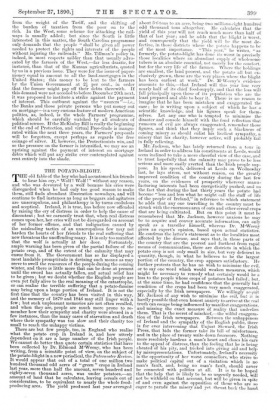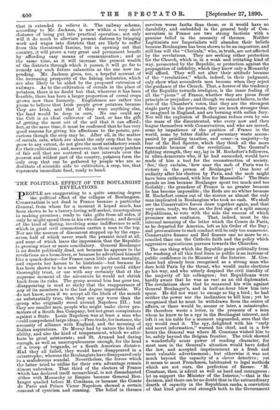THE POTATO-BLIGHT. T HE old fable of the boy who had
accustomed his friends to hear him cry, " Wolf ! Wolf !" without any reason, and who was devoured by a wolf because his cries were disregarded when he had only too good reason to make them, still finds abundant illustration nowadays, and will continue to find instances as long as beggars and agitators are unscrupulous, and philanthropy is by turns credulous and sceptical. Ireland, it is true, has before now offended by raising the cry of distress in order to help the cause of discontent ; but we earnestly trust that, when real distress comes upon her, her cries will not be disregarded on account of her former offence, and that indignation caused by the misleading tactics of an unscrupulous few may not harden the hearts of her friends to the real suffering that now threatens the unoffending many. It is only too manifest that the wolf is actually at her door. Fortunately, ample warning has been given of the partial failure of the potato crop, and of the extent of the calamity that may ensue from it. The Government has so far displayed a most laudable promptitude in devising such means as may serve to swell the resources of the people during the coming winter, and there is little more that can be done at present until the sword has actually fallen, and actual relief has to be given ; but we doubt whether the English people are even yet fully alive to the real meaning of the catastrophe, or can realise the terrible suffering that a potato-famine may bring upon a large portion of Ireland. It is not the first time that the country has been visited in this way, and the memory of 1879 and 1846 may still linger with a few ; but such unpleasant memories are not often recalled, and when they are, people are much more prone to re- member how their sympathy and charity were abused in a few instances, than the many cases of starvation and death where their sympathy was too slow and their charity too small to reach the unhappy victims.
There are but few people, too, in England who realise what the potato crop in Ireland is, and how utterly dependent on it are a large number of the Irish people. We cannot do better than quote certain statistics that have been collected by Dr. Edmond M'Weeny, who has been writing, from a scientific point of view, on the subject of the potato-blight in a new periodical, the Paternoster Review. It would appear that out of a total of one million two hundred thousand odd acres of " green " crops in Ireland last year, more than half the amount, seven hundred and eighty-seven thousand acres, was under potatoes,—an amount of land that he calculates, leaving cereals out of consideration, to be equivalent to nearly the whole food- producing area. The yield produced last year averaged about 3.6 tons to an acre, being two millions eight hundred odd thousand tons altogether. He calculates that the yield of this year will not reach much more than half of that of last year ; and he adds that the blight is worst, and consequently that the yield will be the most de- fective, in those districts where the potato happens to be of the most importance. "This year," he writes, "as formerly, the potato-blight has done its worst in precisely those localities where an abundant supply of wholesome tubers is an absolute essential, not merely for the comfort, but for the very life of the farmer. Where the holdings are smallest, the land poorest, and the potato all but ex- clusively grown, these are the very places where the blight has been earliest at work." Dr. M'Weeny's evidence amounts to this,—that Ireland will this year lose very nearly half of its chief food-supply, and that the loss will fall principally upon those of its population who are the least prepared and able to bear it. There is no reason to imagine that he has been mistaken and exaggerated the case ; he is writing upon a subject of which he has a scientific knowledge, and his figures speak for them- selves. Let any one who is tempted to minimise the disaster and console himself with the fond reflection that rumours of evil are always exaggerated, remember those figures, and think that they imply such a blackness of coming misery as should enlist his liveliest sympathy, a misery that his charity, however active, will probably fail in fully relieving.
Mr. Jackson, who has lately returned from a tour in Ireland in order to address his constituents at Leeds, would seem inclined to take a more cheerful view of the case, and to trust hopefully that the calamity may prove to be less serious and more easily averted than the Irish people sup- pose. In his speech, delivered at Leeds on Wednesday last, he lays stress, not without reason, on the greatly improved condition of the country during the last few years, on the evidences of prosperity wherever manu- facturing interests had been energetically pushed, and on the fact that during the last thirty years the potato had become "less and less what he might call the staff of life of the people of Ireland," in reference to which statement he adds that any one travelling in the country must be struck with the enormous area of oats and other cereal crops that are being cultivated. But on this point it must be remembered that Mr. Jackson, however anxious he may be to acquire and convey accurate information, can only speak as a traveller himself, whereas Dr. M‘Weeny gives an expert's opinion, based upon actual statistics. He confirms the latter's statement as to the localities most affected by the disease, and says that, in those parts of the country that are the poorest and furthest from rapid means of communication, there are districts in which the potato crop is not only small in size, but very deficient in quantity, though, in what be believes to be the largest portion of the country, the crop appears satisfactory. He further protests that he has no wish to minimise the evil, or to say one word which would weaken measures, which might be necessary to remedy what certainly would be a loss to the people whose crops of potatoes had failed ; but, at the same time, he had confidence that the generally bad condition of the crops had been very much exaggerated,. especially by the Irish newspapers. We willingly acquit Mr. Jackson of any wish to minimise the evil, but it is hardly possible that even honest anxiety to arrive at the real truth can escape being influenced by manifest exaggerations, and missing the exact measure of reality that underlies them. That is the secret of mischief, —the wilful exaggera- tion of the Irish newspapers. Between the unhappiness of Ireland and the sympathy of the English public, there is for ever intervening that Unjust Steward, the Irish Press, that bids the former take its bill of misfortunes, and in the place of twenty write down fourscore. Nothing more resolutely hardens a man's heart and closes his ears to the appeal of distress, than the feeling that he is being cheated of his pity, and tricked into giving aid and help by misrepresentations. Unfortunately, Ireland's necessity is the opportunity of her worst counsellors, who strive to make political capital out of a visitation which is no man's fault, and, being no man's fault, should never be connected with politics at all. It is to be hoped that the help that is likely to be so urgently needed, will not be withheld on that account, but will be given in spite of and even against the opposition of those who are so eager to parade the misery and yet thrust back the hand. that is extended to relieve it. The railway scheme, according to Mr. Jackson, is now within a very short -distance of being put into practical operation ; not only will it do much to alleviate present distress by bringing -work and wages into districts that are likely to suffer from this threatened famine, but in opening out that country, it will prove a very great and permanent benefit by affording easy means of communication ; and at the same time, as it will increase the present wealth of the districts through which it passes, it will go far to remedy any such future calamities as the one now im- pending. Mr. Jackson gives, too, a hopeful account of the increasing prosperity of the fishing industries, which are also likely to be aided by the proposed extension of railways. As to the cultivation of cereals in the place of potatoes, there is no doubt but that, wherever it has been feasible, there has been a larger proportion of cereal crops grown now than formerly. Englishmen are rather too prone to believe that Irish people grow potatoes because they are Irish, and that if they were anything else, 'the land would be deep in corn. No one could say the Celt is an ideal cultivator of land, or has the gift of getting the most out of the soil that it can afford ; but, at the same time, it must be confessed that he has very good reasons for giving his affections to the potato, pre- carious though the crop may be. After all, in the matter -of cereals, oats, which are • about the only crop that he can grow to any extent, do not give the most satisfactory result for their cultivation ; and, moreover, on those scanty patches of fair soil that are scattered at rare intervals over the poorest and wildest part of the country, potatoes form the only crop that can be gathered by people who are so destitute of scientific aids to cultivation, a crop, too, that represents immediate food, ready to hand.



































 Previous page
Previous page